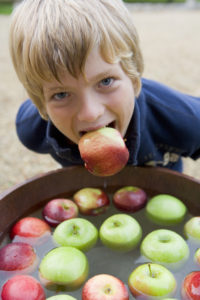
Halloween is one of the spookier holidays to be observed across the world. Historians and researchers believe Halloween’s modern incarnations evolved from a variety of different sources, though a vast majority of them seem to have originated across Europe at various points in time. It can be weird to think about how dressing up, asking strangers for candy, watching horror movies, and bobbing for apples all fit together, but it can be fascinating to delve into the details on where these various traditions came from.
If you love the Halloween tradition, then you might want to learn about the origins of some of the more popular customs surrounding this holiday. Explore these facts and get yourself ready for the spookiest time of year!
Which Came First: The Tricks or the Treats?
Most people first encounter the Halloween tradition when they’re young children. Due to this, the first impression many people have about this holiday involves trick-or-treating. Scholars debate the exact origins of this practice, though most agree that it began somewhere in Europe. In the nation now known as Ireland, the early Celtic people would celebrate Samhain, a festival surrounding the spirits of the deceased. One tradition the people had was to leave out plates of food for restless spirits, hoping to appease the ghosts and apparitions for the year.
Other scholars trace the origin of trick-or-treating back to the Middle Ages. In Scotland during this time, it was not uncommon for poorer people to lack nourishing food. During this time of year, people would go door to door and ask for food. In exchange, the people would offer to say prayers for those living in the house. No matter where this tradition began, it is easy to see why kids love going from house to house asking for treats.
How Do Ya Like Them Apples?
Another interesting tradition to trace back is bobbing for apples. This game involves placing a bunch of ripe apples into a tub or basin of water, then having players dunk their heads into the water while trying to catch the apples between their teeth. Though a simple game, it can be confusing to see how it fits in with all the ghouls and witches of the season. According to scholars, the tradition of bobbing for apples can be traced back to Ancient Rome and the Festival of Pomona.
Pomona was the goddess of fruitful abundance. Her festival involved many activities related to the annual autumn harvest. Since apples were often found in surplus during this time of year, the game of bobbing for apples developed. Unlike today, young men and women would play this game during the Festival of Pomona in order to get their fortunes told and learn a bit more about the direction their romantic lives were headed. Whether played for romance or fun, the rules of bobbing for apples have remain essentially unchanged over the centuries.
Black Cat Detector
Black cats are often associated with Halloween and, specifically, are considered scary signs of bad luck. The origins of this belief involve some unfair assumptions about kitties. During the Middle Ages, cats that were totally black were considered minions of the devil. Later, during the Salem Witch Trials, this stereotype was reinforced when accused “witches” were revealed to own black cats. Despite the persistence of the superstition, most people nowadays understand a black cat is just a furry friend who happens to blend in with the shadows exceptionally well.
For many people around the world, Halloween is a fun and spooky time of year when people are encouraged to dress up, commune with spirits, and get in touch with their darker sides. By taking time to learn a bit more about the origins of various Halloween traditions and superstitions, you can discover exactly why this popular holiday has persisted for so long throughout history in various forms.

